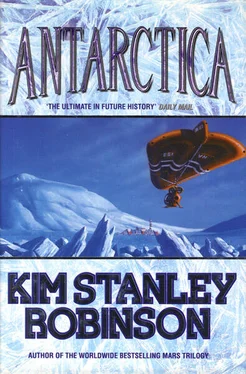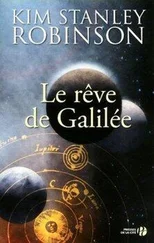“Maybe,” Val said darkly. Feeling bad about what she had done to X was another reason she was toast.
“Oh come on,” Randi was saying, “he’ll love it. That’s the kind of dreamer he is.”
“Maybe.”
Wade Norton had just solved the last movement of Tchaikovsky’s Fifth Symphony when his boss Senator Phil Chase called. It was late on a very hot September evening in Washington D.C., part of a heat wave in fact, the temperature 115°F. with humidity near a hundred percent, the roar of the city outside the window damped down as all parts of the metropolis went into Turkish-bath mode, stewing as they waited out the latest EWE, or extreme weather event. Torrential floods, blistering droughts, record highs and lows, earthquakes, tornadoes, hurricanes, assorted other superstorms; this year, like all the last several years, had seen everything.
Wade had been sitting before his overmatched air-conditioning unit, conducting the Fifth for a few hours. He had been working on this version during his snippets of spare time for eight months, studying the score and recording bar by bar, struggling especially with the finale, using the latest Maestro program to manipulate all possible aspects of pitch, tempo, dynamics, color, intonation, vibrato and so forth, all down at the level of the individual soundwaves on the oscilloconductor, working mostly with synthetically generated sound but occasionally with the instruments in a base performance recorded for Maestro by the Vienna Philharmonic. And now he had the version he wanted. And it had been no easy thing, because the last movement was, as Brahms had noted to Tchaikovsky after hearing a performance in Hamburg, somewhat of a mess structurally. In his usual insecure way Tchaikovsky had immediately agreed with Brahms, and it had taken him a couple of months to rally and decide that it was not his Fifth that was deficient but Brahms himself, whose music Tchaikovsky said was “the pedestal without the statue,” a riposte which still made Wade smile, and had even given him a clue to conducting the Fifth, which was to treat it as a statue without a pedestal, floating in the air like a tone poem, the beauty of each component passage different in kind from the other passages; then turn the variously awkward junctures as best he could, exploiting things the Maestro could do that living orchestras would find hard. The home-conducting subculture was of course mostly uninterested in these overplayed warhorses of the concert hall, exactly the material from which computer conducting had freed them; and indeed Wade was coming to this piece from several years’ work on unrecorded music in the opuses of D’Indy, Poulenc, and Martinu; but recently there had been movements, obviously related, to explore both “sensuous surface” and the neglected warhorses, and Wade felt that this performance he had put together was perhaps good enough to justify sending it out, at least to the Tchaikovsky crowd, the finale of the Fifth being somewhat in the nature of Fermat’s last theorem, to which his version might be the Wiles proof.
But there was the phone beeping. And of course it was Phil, Senator Philip Krishna Chase of California, his boss and friend, calling from the other side of the world and uncertain of the time difference as always. Phil had two years before lost the chair of the Senate Foreign Relations Committee, and was often spoken of as passé following the Republican retaking of both Senate and House that year; he had seldom been in Washington since (not that he had been here all that often before), and he appeared intent on proving that as the great telesenator he could do his job while on a more-or-less permanent junket/global pilgrimage (depending on who was characterizing it). The pundits were convinced he was wrong, and there were weekly calls for Phil to get back to his job and put his nose to the grindstone like everyone else, etc.; and back home in California Chase had the highest negatives and the highest positives ever recorded. But he had won his last reelection by twenty-three percent, and as Phil often said, California had led telecommuting from the very beginning, even before the technology was there, and most Californians were proud of their senator’s work among the many troubled, overcrowded, starved, flooded, and drought-stricken countries of the developing world which Phil made his specialty—proud also of the breakthroughs he had made in telecommuting itself, working the Senate from all over the world and introducing legislation to make it even easier for people to do likewise on their jobs. So with his power base secure Chase continued to walk and paraglide around the world, pitching in to help local relief work and employee-owned eco-businesses, and doing his Washington work by phone, fax, proxy, an active staff, and the occasional spaceplane blitz on the capital.
So Wade was used to punching the button on the phone and hearing “Wade! Wade! Time to work!”
“Hi, Phil.” Wade hit save on the Maestro and reached for a notepad. Typically these conversations would last for half an hour to an hour, and include a dozen commands, two dozen suggestions, and three dozen reflections; he took notes so he would not forget anything in the deluge. “Where are you tonight?”
“It’s morning, Wade, it’s tomorrow where you are, and I’m in Pakistan, walking up to the sixteenth tee, five under handicap and shooting with the wind all the way home, but let’s get to the point, Wade. I hear that you are the staff expert on Antarctica.”
“Antarctica?”
Phil had a wild laugh; it was said to have won him his first election. “Yes, John tells me you had to work it up as part of your Southern Club studies.”
“Yes, but that was just an overview.”
“I know, I have it right here onscreen. ‘Complications Attendant on the Non-Renewal of the Antarctic Treaty, an Overview.’ By WN.”
“Yes.” Wade had researched the Antarctic Treaty System (a complex of treaties, protocols and agreements) the previous year, when Senator Winston, Phil’s replacement as Chair, had directed his majority on the Foreign Relations Committee to vote to sit on the ratification of the Treaty’s scheduled renewal, which had been in negotiation the previous three years. It had seemed clear to Wade that the blockage of the ratification, aside from being part of a general strategy of obstruction of the President on all fronts, had to do with Senator Winston’s ongoing battle with the Southern Club, and for that matter with the southern hemisphere in general, home in Winston’s mind of all ungodly sloth and indolence. Also the renegotiated treaty continued to contain the bans on oil, mineral, and other resource extraction that it had had since the 1991 environmental protocol had been attached; of course Wall Street had been unhappy about that, as it did not fit with their ongoing campaign to dismantle all remaining global environmental regulations and any other constraints to the full exercise of the free market, etc.
All part of the ordinary contemporary political battlefield, in other words; and interesting in that respect; but the idea that Wade was therefore an expert on Antarctica was laughable, as Phil was proving at this very moment. Wade had learned what he had needed to know the way one crams for a test, and afterward retained the usual portion of knowledge from such efforts. Antarctica! as he and the staff had often proclaimed at that time—the highest, coldest, driest, iciest, windiest, and least significant of the continents!
Through Chase’s last chuckles he said, “I didn’t learn that much about it, Phil. I like my ice in Bloody Marys.”
“You’re very wise in your modesty, Wade. Here, wait a second while I make this drive. Ooh. But you’re my staff expert on the place, Wade, and there’s been some things come up in the last month that I want you to look into for me. It appears the absence of a ratified treaty is beginning to wreak some havoc down there, and if we can find out anything that we could use against Winston, naturally it would be a good thing. Of course I’d go myself to have a look around, it sounds great, but I have—ah come on!—business in Kashmir that can’t wait.”
Читать дальше











